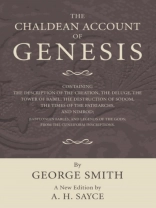In this early work of Assyriology, Smith provides his analysis of the Gilgamesh Epic as well as Enuma Elish in their relation to the Old Testament. Five years after his death, the renowned Assyriologists, A. H. Sayce revised and updated his work.
The stories and myths given in the foregoing pages have, probably, very different values; some are genuine traditions–some compiled to account for natural phenomena, and some pure romances. At the head of their history and traditions the Babylonians placed an account of the creation of the world; and, although different forms of this story were current, in certain features they all agreed. Beside the account of the present animals, they related the creation of legions of monster forms which disappeared before the human epoch, and they accounted for the great problem of humanity–the presence of evil in the world–by making out that it proceeded from the original chaos, the spirit of confusion and darkness, which was the origin of all things, and which was even older than the gods.
–from the Conclusion
About the author
A. H. Sayce (1845-1933) was a longtime professor at Queen’s College, Oxford University. A comparative philologist and orientalist, Sayce was a leading Assyriologist of his generation. Among his many publications are ‘The Principles of Comparative Philology, ‘ ‘The Archaeology of the Cuneiform Inscriptions, ‘ ‘Astronomy and Astrology of the Babylonians, ‘ and ‘The Ancient Empires of the East.’







![Cover of Brian Schrag & Julisa Rowe: Community Arts for God's Purposes [Chinese] 貼近神心意的社群藝術 Cover of Brian Schrag & Julisa Rowe: Community Arts for God's Purposes [Chinese] 貼近神心意的社群藝術](https://static.worldofdigitals.com/thumb_webp/740/9781645083740.webp)




